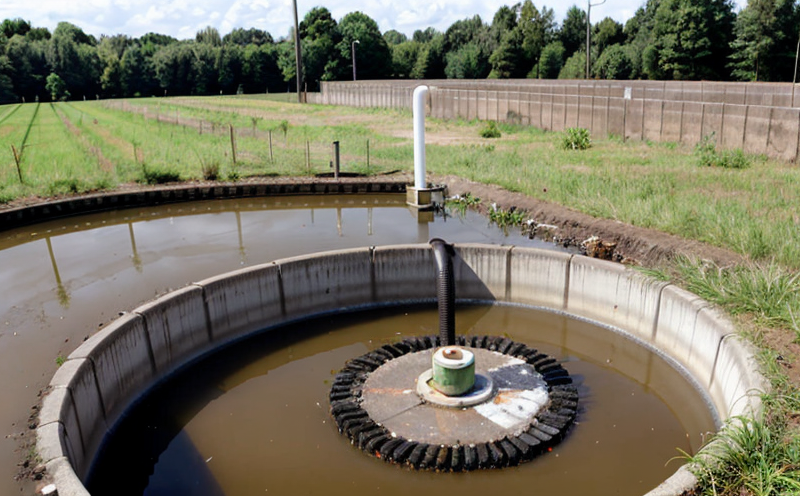ISO 17294-2 ICP-MS Trace Elements Testing
The ISO 17294-2 standard provides a robust framework for trace elements analysis in environmental and industrial samples using Inductively Coupled Plasma Mass Spectrometry (ICP-MS). This method is particularly useful for detecting low levels of metallic contaminants, which can have significant impacts on water quality, aquatic life, and public health.
Our laboratory utilizes state-of-the-art ICP-MS instrumentation to perform this testing. Our approach ensures precision and accuracy down to the nanogram per liter (ng/L) level, which is critical for monitoring compliance with stringent environmental regulations like the US Environmental Protection Agency's (EPA) Safe Drinking Water Act or European Union’s Water Framework Directive.
Sample preparation involves thorough digestion of matrices such as wastewater or effluent using strong acids. This step ensures that all trace elements are liberated and available for analysis, thus reducing matrix effects and improving analytical precision. The resulting solutions undergo rigorous quality control checks before being introduced into the ICP-MS instrument. Our laboratory adheres strictly to ISO 17294-2 guidelines throughout this process.
The use of ICP-MS allows us to measure multiple elements simultaneously, saving time compared to traditional atomic absorption spectroscopy (AAS). Additionally, it provides greater sensitivity and lower limits of detection for many elements. This capability is essential when dealing with complex samples where numerous trace elements may be present at very low concentrations.
Our laboratory's proficiency in ISO 17294-2 ICP-MS trace elements testing extends beyond mere compliance checking; it also supports R&D efforts aimed at identifying new contamination sources or developing more efficient treatment technologies. By providing reliable data on trace element levels, we enable clients to make informed decisions about their processes and facilities.
Furthermore, our expertise in this area helps ensure that wastewater treatment plants operate efficiently while minimizing ecological impacts. For instance, understanding the presence of certain metals can guide optimization strategies for sludge management or nutrient recycling programs within the plant.
In summary, ISO 17294-2 ICP-MS trace elements testing serves as a cornerstone in our commitment to delivering high-quality analytical services tailored specifically towards addressing challenges faced by industries involved in water and wastewater management. Through rigorous adherence to international standards and advanced instrumentation capabilities, we strive to offer accurate results that contribute directly to sustainable practices throughout the sector.
Benefits
The implementation of ISO 17294-2 ICP-MS trace elements testing offers several key advantages:
- Informed Decision Making: Provides detailed insights into the composition of industrial effluents, helping stakeholders take proactive measures to address potential issues early.
- Regulatory Compliance: Ensures strict adherence to relevant environmental regulations by offering accurate and reliable measurements of trace elements in water samples.
- Eco-Friendly Solutions: Supports the development of sustainable practices through better understanding of contamination sources, promoting more effective waste reduction initiatives.
These benefits collectively contribute to improved operational efficiency, enhanced environmental stewardship, and ultimately, greater overall satisfaction among clients who rely on our services for critical decision-making processes related to water quality management.
Customer Impact and Satisfaction
By leveraging ISO 17294-2 ICP-MS trace elements testing, customers experience multiple tangible benefits that translate into higher levels of satisfaction:
Accurate Data: Our laboratory delivers precise measurements of trace elements down to the ng/L range, ensuring reliable data for informed decision-making.
Compliance Assurance: With stringent adherence to international standards, clients can rest assured that they are meeting regulatory requirements effectively and efficiently.
Sustainable Practices: Insights gained from our testing help identify areas where improvements can be made in terms of resource use efficiency and waste minimization efforts.
Competitive Edge: Understanding the composition and quality of industrial effluents allows companies to stay ahead of competitors by adopting best practices and innovative solutions.
Overall, these factors contribute significantly towards fostering long-term relationships based on trust, reliability, and mutual success. Our commitment to excellence ensures that every client receives top-notch service that meets or exceeds expectations in all aspects of water quality management.
Environmental and Sustainability Contributions
- Pollution Prevention: By detecting trace elements early, we assist clients in preventing pollution before it becomes a significant issue.
- Eco-Friendly Processes: Our findings enable the optimization of industrial processes to reduce environmental impact.
- Biodiversity Preservation: Minimizing contamination helps preserve ecosystems and biodiversity around water bodies.
The cumulative effect of these contributions is a healthier planet where resources are used efficiently, waste generation is minimized, and environmental degradation is reduced. Through ISO 17294-2 ICP-MS trace elements testing, we play an active role in promoting sustainability across various sectors involved in water management.





